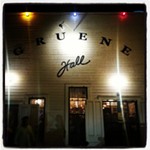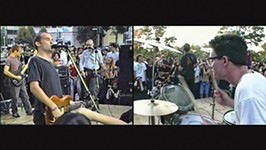Down Every Road with Merle Haggard
“He was a character out of The Grapes of Wrath”
By Tim Stegall, 11:30AM, Thu. Apr. 7, 2016
News broke on Wednesday afternoon via a Facebook post from Ben Haggard: “A week ago, Dad told us he was gonna pass on his birthday, and he wasn’t wrong. An hour ago, he took his last breath surrounded by family and friends.”
“There’s something magical to that,” said Dale Watson yesterday. “The only other person I can think of that died on his birthday was Edgar Allan Poe – Halloween to Halloween. William Shakespeare, too. One poet dies, and another poet dies ....”
Austin’s honky-tonk hero trailed off, considering the passing of country music’s everyman at the age of 79. You’ll read myriad knightings of Merle Ronald Haggard of Oildale, Calif., who’d battled double pneumonia much of this year. Most will call him the “working man’s poet.”
“He was pretty simple,” remarked Dave Alvin, accomplished roots-punk songwriter. “He knew how to get to the heart of something. In his best songs, he wrote simple statements that affected you emotionally with a few simple words. You could do it with a lot of words, like Bob Dylan with ‘Sad-Eyed Lady of the Lowlands’ or ‘Like A Rolling Stone.’
“Or you could do it simply, like [Haggard’s] ‘Today, I Started Loving You Again.’”
A line from “(My Friends Are Gonna Be) Strangers” by Liz Anderson, famously covered by Haggard, comes to mind when addressing economy by songwriters: “The only things I can count on now are my fingers.”
“Oh yeah!” exclaims Alvin. “And that was probably something he overheard in a barroom. He had that ability early on, and I don’t think he had aspirations back then towards art. I think he was just trying to make a buck and write some songs.”
“He spoke to Texans because he was the working man’s poet,” says Watson. “His was as much a Texan’s heritage as a Californian’s, I feel.”
“He was a character out of The Grapes of Wrath,” states second generation country outlaw and fellow local Jesse Dayton.
“The mythology is there,” affirms Alvin, “being born in a boxcar in Oildale, up there near Bakersfield. He’s the first generation of kids that were born in California after the mass Dust Bowl migration here in the Thirties. Their roots were in Oklahoma and Texas, but they were Californians.”
“Well, his music was certainly in every honky-tonk I ever went into,” says Watson. “Growing up in [Houston suburb] Pasadena, ‘Swingin' Doors,’ ‘Tonight the Bottle Let Me Down,’ and ‘Silver Wings’ were staples that every band had to play. You had to know those songs. You had to know ‘Today I Started Loving You Again.’ I’ve never been in any bar in Texas where you didn’t play those.
“I do a mandatory Merle song every night I play, and there’s a reason for that. If you want them to pay attention or to slow dance, I play ‘Silver Wings.’ It works every time.”
“He’s the only one who ever did hard time,” refers Dayton to Haggard’s late-Fifties prison sentence in San Quentin, where he was famously inspired by a Johnny Cash performance to become a country musician himself. “Every country singer I know, including myself, has been thrown in a drunk tank. But there’s a big difference between that and committing an armed robbery.
“I opened several shows for him at Rockefeller’s in Houston in 1995. When I told him I was from Beaumont, he said, ‘I used to hang out there all the time with Jack Clement when Elvis had blonde hair.’ Probably half-joking, but he was a champion of the B-market, working-class venues.
“Think about that: I’m opening for him at Rockefeller’s, which barely holds 500 people.”
That was an odd juncture in Haggard’s career. The Chronicle encountered him the following year, at a press conference prior to a local firefighters benefit at Palmer Auditorium. After 20 years dominating country radio and being the genre’s best-selling artist, he hadn’t seen a No. 1 or any significant airplay since “Natural High” 11 years earlier.
1996 also saw the release of Down Every Road, a 4-CD box set devoted to Haggard. When he and I spoke about it, a remark about country music having been hijacked away from artists by models set him off.
“It’s almost like someone’s censoring music nowadays,” groused Haggard. “I don’t think the public is getting a fair listen to what’s really happening. I don’t think they get a listen of the stuff that’s great anymore. A lot of things that they hear are there for reasons other than music.
“They’re writing songs about videos. The song has become secondary. I think a song should be good enough to where you don’t have to draw no pictures. I think that’s why we’re losing such a great amount of quality.
“Music’s so thin. It’s so refined – so perfect. It’s unenjoyable to me. I just can’t even listen to it.”
Even if that era was a sad one musically for Haggard, he continued on his path, undeterred. Dayton recalls hanging out with him on his tour bus.
“He was teaching himself a Bob Wills twin fiddle part. He learned both parts. He was always putting in his 10,000 hours, always practicing.”
And always connecting Texas musicians to their heritage, via projects like his homage to Wills, A Tribute to the Best Damn Fiddle Player in the World.
“I told him when I met him I would never have known as much about Bob Wills without him doing that album,” states Watson. “He played until he went into the hospital.”
“It’s a sad day in music,” remarks Dayton, “and not just country music. He was bigger than that. He transcended his genre.”
“He loved everything about life,” remarked Ben Haggard in his Facebook post, “and he loved that every one of you gave him a chance with his music. He wasn’t just a country singer. He was the best country singer that ever lived.”
A note to readers: Bold and uncensored, The Austin Chronicle has been Austin’s independent news source for over 40 years, expressing the community’s political and environmental concerns and supporting its active cultural scene. Now more than ever, we need your support to continue supplying Austin with independent, free press. If real news is important to you, please consider making a donation of $5, $10 or whatever you can afford, to help keep our journalism on stands.
Dec. 8, 2023
Aug. 11, 2023
Merle Haggard, Dale Watson, Dave Alvin, Blasters, Jesse Dayton, Johnny Cash, Bob Wills, Edgar Allen Poe, Shakespeare, Bob Dylan











